Office of the National Security Council
Organizational Chart of the National Security Council Office
Organizational Structure
Office of the National Security Council
Monitoring, Audit and Evaluation Mission Group
Anti-Corruption Operation Center
Mission:
- Provide recommendations to the Secretary-General on prevention and suppression of corruption and misconduct of the Office, assess risks and determine risk management measures, and prepare action plans related to prevention of corruption and misconduct and promotion of morality and ethics of the Office.
- Expedite and supervise implementation of action plans related to prevention of corruption and misconduct and promotion of morality and ethics of government agencies in the Office. Act as the secretary of the NSC Ethics Committee.
- Carry out relevant tasks in accordance with laws on ethical standards and Civil Service Code of Ethics. Receive complaints about corruption, misconduct, omission of duties, and violations of ethics by officials in the Office.
- Monitor and evaluate achievements, and prepare reports on prevention of corruption and misconduct, and promotion of morality and ethics of the Office.
Outstanding Performances:
1. Drive plans for prevention and suppression of corruption and misconduct of the NSC such as preparation of the NSC’s corruption risk management plan, and integrity and transparency assessment (ITA) etc.

2. Drive the NSC’s implementation on promotion of ethics and morality such as morality assessment of communities, organizations, districts and provinces, and preparation of the NSC’s ethics promotion action plans etc.

Internal Audit Group
Mission:
- Conduct financial and fiscal audits, including compliance with regulations and assessment of operational processes to ensure that the organization’s executives are able to carry out missions in accordance with the specified objectives and goals correctly and transparently.
- Provide advices neutrally and independently for effective organizational operations in line with the principles of good governance and sustainable development, including coordinating and supporting the operations of relevant units within the organization or as assigned.
Public Sector Development Division
Mission:
According to the Ministerial Regulations on the Organizational Division of the Office of the National Security Council, Office of the Prime Minister, B.E. 2563 (2020), Section 6 on the Office of the National Security Council specifies that there shall be a Management System Development Group to perform the main duties in developing the administration of the Office to be effective, efficient and worthwhile. It is reports directly to the Secretary-General with responsibilities and authority to provide advice to the Secretary-General on strategies for bureaucratic development of the Office; monitor, evaluate and prepare reports on bureaucratic development; and coordinate and carry out bureaucratic development in collaboration with relevant agencies.
Outstanding Performances:
1. In the Assessment of Government Agencies According to the Measures to Improve Efficiency in Government Operation, the assessment result of the National Security Council is at a high standard level, receiving 83.99 points.

2. Receive the Public Sector Management Quality Award (PMQA) 4.0 at the advance level with 400.95 points. This was the first time that the NSC received full scores in Category 2 about Strategic Planning and Category 5 about Focus on Personnel.

3. Develop the “NSC Business Continuity (BCP) Plan B.E. 2567 – 2570 (2024 – 2027)” to drive installation of a warning system throughout the Office, and establish a safety drilling system related to public disasters and cyberattacks to reduce risks to the NSC’s information technology system.

4. Developed the “Guidelines for NSC Implementation with Service Recipients and Stakeholders B.E. 2567 – 2570 (2024 – 2027)”. Create a satisfaction assessment form for enabling the NSC’s internal units to use it as an important tool to improve and develop services to meet the needs and expectations of service recipients and stakeholders of the NSC.

5. Perform the NSC organizational analysis by listening to opinions and suggestions of the NSC personnel and external network partners to be used as a database for drafting proposals in dividing the NSC offices according to the guidelines for the bureaucratic division within the Department.

Legal Affairs Unit
Mission:
- Administer, coordinate and monitor the enforcement of the National Security Council Act, Emergency Decree on Public Administration in Emergency Situations, and related security laws. Study and analyze legal issues, and provide opinions and suggestions on amendments or revisions to laws related to national security to support the Office’s security policy and strategic operations.
Outstanding Performances:
1. Arrange the Emergency Situation Administration Committee meetings with the purpose to consider appropriateness of reducing the area under the Emergency Decree on Public Administration in Emergency Situations B.E. 2548 (2005), and extending the period of declaration on serious emergency situations in the southern border provinces.

2. Evaluate effectiveness of the enforcement of the Emergency Decree on Public Administration in Emergency Situations B.E. 2548 (2005) to listen to opinions from government agencies and the public regarding the enforcement of the Emergency Decree on Public Administration in Emergency Situations B.E. 2548 (2005) in the past 3 cases: the pandemic of the coronavirus 2019 disease, the unrest situations and political gatherings, and the unrest situations in the southern border provinces.

Institute of Security Studies*
Mission:
- Study, research, collect data, develop and disseminate knowledge related to national security to enhance potential and manage security think tanks.
- Promote, coordinate and collaborate in security academic affairs with relevant sectors in an informal format (Track 1.5) or academic sector (Track 2) both domestically and internationally.
- Support academic studies, training and conferences to seek new knowledge necessary for mission operations.
Outstanding Performances:
1. Security studies training courses

2. Academic conferences and seminars

3. Security Perspectives Journal

Office of Experts*
Mission:
Outstanding Performances:
Division of Security Policy and Strategy
Mission:
- Prepare, monitor, evaluate, develop and drive national policies and plans on national security, and integrate the linkages between national policies and plans on national security and national strategies, national economic and social development plans, and related national master plans.
- Consider and provide opinions to government agencies to consider in supporting budgets for plans or projects related to national security in important issues. Monitor the overall performance of specific security strategies or plans, including being responsible for coordinating national strategies related to the Office.
- Coordinate or collaborate with domestic and international agencies in security affairs in various dimensions such as strategic security, environmental assessment, and other security-related academic matters.
- Act as a secretary of committees and subcommittees as assigned, such as the National Security Council, the Integration of Driving National Security Strategy Committee, the Sub-committee on the Development of Comprehensive Security Management Mechanisms, and the Cabinet Submission Screening Committee, Group 1 (in Security, Laws and Justice Process).
Outstanding Performances:
1. Integration of driving and monitoring national security strategies to align with government policies
- Draft development of security management mechanisms
- Evaluate and score project proposals to drive achievement of goals according to the national security strategy
- Monitor and evaluate national security strategy implementation

2. Driving and monitoring the National Security Policy and Plan B.E. 2566 – 2570 (2023 – 2027)
- Drive the National Security Policy and Plan B.E. 2566 – 2570 (2023 – 2027) under the concept of “When the world adjusts and threats change: Join in driving forward 17 policies towards sustainable security in Thailand” to enhance awareness and promote understanding among the host agencies responsible for integration of driving government agencies at all levels and sectors involved in transmission of national policies and plans, etc. towards implementation.
- Drive and monitor the National Security Policy and Plan B.E. 2566 – 2570 (2023-2027) at the local level (covering 6 regions, 76 provinces) to monitor and inspect security situations at the local level, and acknowledge problems and obstacles for use in improving approaches to efficiently driving policies and plans.

3. Development of Policy Tools
- Develop the NSC towards excellence in comprehensive security management (NSC Policy Design) to develop modern policy design concepts and tools that can be used to further develop policy innovations
- Discuss to develop the Thailand National Index (NSI) as a policy regulator to supervise, monitor and evaluate the overall performance of security missions, and to be used in preparing new national security policies and plans.

4. Management of the National Security Committee Mechanism
- National Security Council
- National Security Council Policy Committee
- Cabinet Submission Screening Committee, Group 1 (in Security, Law and Justice Process)
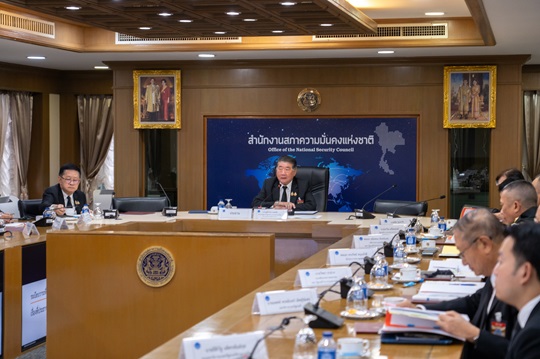
Threat Assessment Division
Mission:
- Assess and analyze security situations and environments, including verifying and predicting situations and threats that pose risks of threatening national security.
- Coordinate intelligence operations with both domestic and international intelligence communities, including operations related to national security.
- Monitor, assess, analyze and warn of situations that may pose threats to national security, and provide recommendations for determining the severity levels of the threat to the National Security Council, and provide opinions, guidelines, measures, or other actions necessary to solve the problems to the Prime Minister or the Cabinet.
Outstanding Performances:
1. Monitor situations, assess and verify threats through the mechanism of intelligence cooperationby holding meetings with the intelligence community and related security agencies to monitor and exchange situation assessments on important threats that may affect national security and interests, to present to the Deputy Prime Minister and the Prime Minister for consideration and further policy orders.
2. Make security cooperation with foreign countries.Security situations and threats in the world are changing rapidly with widespread impacts. The NSC, as Thailand’s policy-level security agency, needs to seek cooperation with friendly countries that have aligned interests and are ready to cooperate with Thailand in both managing and responding to threats. This is an important part in enabling the NSC to effectively propose measures that are appropriate for threat situations.
3. Develop potentials in threat assessmentto support the strategic security situation assessment of the NSC to be effective and tangible by using the Structured Analytical Techniques (SATs) and Foresight techniques to enable assessment and analysis of the situations to be carried out accurately, to identify security issues accurately and comprehensively, and to prioritize them with support by principles and theoretical concepts, which will be useful in preparing to deal with national threats effectively in the future.
Division of Security on National Preparedness and Defense
Mission:
- Recommend, prepare, monitor, drive, evaluate and develop specific security strategies and plans related to national preparedness, crisis management, development to enhance national security, and national defense, including knowledge accumulation to enhance national security.
- Administer national security crisis management, and coordinate with domestic and international incident management networks in both normal and abnormal situations.
- Propose approaches and measures, administer and coordinate implementation of related specific policies, strategies and plans.
- Act as a secretary of the committee and subcommittees as assigned.
- Work with or support work operations of other relevant agencies or as assigned.
- Evaluate and analyze high-risk situations that may lead to national crises, military threats, situations affecting national defense, and overall national security, and security related to resource bases, including creation of relevant databases.
- Recommend, prepare, monitor, drive, evaluate and develop specific security strategies, approaches and plans related to national preparedness, crisis management, strengthening spatial security, national defense, and internal security maintenance in both land and sea areas, including promotion of knowledge to enhance national security.
- Propose guidelines or measures, direct and coordinate the implementation of specific security policies, strategies and plans.
- Organize national crisis management training with the National Security Council as the national training management agency, and promote agencies responsible for each threat issue to be the training management agency at the agency level.
Specific Security Plans:
National Preparedness Plan and Crisis Management Plan
Outstanding Performances:
1. Final standard adjustment training to support the 2024 National Crisis Management Exercise (C – MEX TTX 24 FPC)

2. 2024 National Crisis Management Exercise (C-MEX 24) in a Table-Top Exercise model

3. Workshop for after-action review of the National Crisis Management Exercise (C – MEX: AAR)

4. Field study of security threats/problems in the areas, and monitoring preparation and implementation of the Development to Strengthen Security in Specific Area Project in various provinces
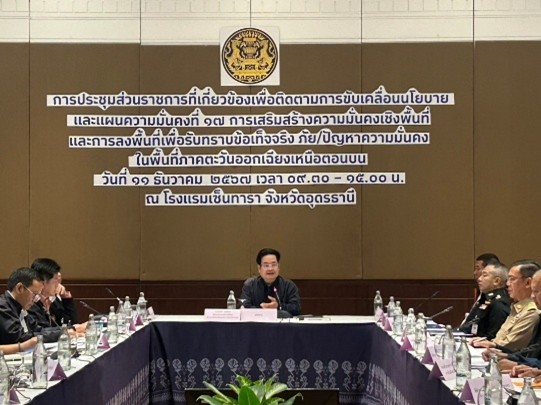
5. Development and design of electronic assessment reports (EAR) in specific security plans.
6. Draft “Integrated Security Crisis Preparedness and Management Policy Guidelines”
Division of Countering Transnational Threats
Mission:
- Evaluate and analyze transnational threat situations, transnational crimes and terrorism that affect national security, including creating relevant databases to support security operations.
- Recommend, prepare, monitor, drive, evaluate and develop specific security strategies and plans related to prevention and resolution of transnational threats, transnational crimes and terrorism.
- Strengthen and coordinate domestic and international cooperation on prevention and resolution of transnational threats, transnational crimes and terrorism to create an integrated response to transboundary threats.
- Evaluate, analyze, recommend and develop cybersecurity plans during crises, and coordinate domestic and international cooperations related to cybersecurity.
- Propose guidelines or measures, direct and coordinate implementation of specific security policies, strategies and plans.
Specific Security Plan:
Counter-Terrorism Action Plan
Outstanding Performances:
1. Prevention and counter-terrorism and violent extremism
- Develop/drive action plans for the Counter-terrorism Action Plan B.E. 2566 – 2570 (2023 – 2027) to build capacity to respond and manage situations in the case of a terrorist incident, ensuring readiness during normal times, and potential to recover from impacts of terrorist threats.
- Interact with friendly countries/international organizations to enhance counter-terrorism capabilities such as 1) cooperation with the Protect & Prepare Project of Cyber Crime Investigation Bureau, Embassy of the United Kingdom in Thailand, 2) participation in the Sub-Regional Meeting on Counter Terrorism and Transnational Security (SRM).


2. Implementation of security cooperation under the multilateral framework
- Participation in the meeting under the framework of the Bay of Bengal Initiative Multi-Sectoral Technical and Economic Cooperation (BIMSTEC).
- Meeting under the sub-working group mechanism of the joint working group on counter-terrorism and transnational crime under the BIMSTEC framework

3. Implementation of cyber security prevention and resolution in the 2nd Thailand
- Republic of Korea Cybersecurity Dialogue on May 15 – 17, 2024 in the Republic of Korea

Division of Security on Border and Neighboring Countries Affairs
Mission:
- Evaluate and analyze situations affecting security of borders, neighboring countries, and the Mekong sub-region, including creating relevant databases to be used in planning measures and approaches for solving related problems.
- Develop specific security strategies and plans related to border security, border security management, border trade and economics in the security dimension as well as security for neighboring countries and the Mekong sub-region.
Specific Security Plan:
Border Security Management Action Plan
Outstanding Performances:
Prepare and drive the “Border Security Management Action Plan B.E. 2566 – 2570 (2023 – 2027)” such as developing the Thailand’s Border Dashboard), organizing or controlling areas with border problems, and preparing to upgrade border crossings as well as monitoring and evaluating situations, and finding solutions to border security problems.

Division of Internal Security
Mission:
- Develop specific security strategies and plans related to security of the nation’s main institutions Oversee domestic affairs, socio-psychological issues, population migration, including people fleeing armed conflict, implementation in compliance with international human rights obligations, and creation of reconciliation. In addition, conduct assessments and analyze situations affecting security of the nation’s main institutions, including creating a database to be used in planning measures and approaches for solving related problems.
- Supervise operations to ensure compliance with relevant security policies, strategies, and plans, and coordinate with relevant agencies or as assigned.
Specific Security Plan:
Action Plan for Maintaining the Main National Institutions
Outstanding Performances:
1. Development of the “Action Plan for Maintaining the National Institutions B.E. 2564 – 2570 (2021 – 2027)”.

2. Implementation to resolve nationality and personal status issues: The NSC proposed “Criteria for expediting the resolution of nationality and personal status problems for persons who have immigrated to the Kingdom for a long time and children born in the Kingdom” for the Cabinet’s consideration. The Cabinet approved the principles of the criteria on October 29, 2024.

3. Management and assistance for Myanmar refugees with emphasis on management and assistance for Myanmar individuals affected by the political unrest in Myanmar on February 1, 2021.

Division of International Security
Mission:
- Evaluate and analyze situations in international affairs with countries in various regions of the world and international organizations that affect national security, including creating relevant databases for planning operations, and determining relevant approaches and measures.
- Develop specific security strategies and plans related to international security to maintain national security and approaches for operations related to the major powers, the Middle East, South Asia, the Asia-Pacific Islands, Africa, the Muslim world, the Association of Southeast Asian Nations (ASEAN). Implement international security obligations and related international cooperation frameworks.
Outstanding Performances:
1. 1st Indonesia Thailand Security Dialogue

2. Proliferation Security Initiative (PSI) Southeast Asia Workshop 2024

3. 1st Thailand-United Kingdom Security Dialogue

Southern Border Provinces Security and Ethnic Affairs Division
Mission:
- Develop policies for administration and development of the southern border provinces, including strategies, plans and measures related to resolving security issues in the area, assessing and analyzing situations that affect security of the southern border provinces both domestically and internationally, and creating relevant databases to lead to planning for measures and approaches for resolving related issues.
- Prepare and drive missions to promote a multicultural society in Thailand, and peaceful work for security along with creating a database of ethnic groups, and promoting resolution of overlapping land use issues for ethnic groups in a sustainable manner.
Specific Security Plan:
- Action Plan for Promoting Coexistence under a Multicultural Society in Thailand
- Plan for supporting education of Thai Muslim students studying abroad
- Policy for management and development the southern border provinces
Outstanding Performances:
1. Prepare the “Southern Border Provinces Administration and Development Policy B.E. 2565 – 2567 (2022 – 2024)”to serve as the main framework for solving problems in the southern border provinces, and draft the Southern Border Provinces Administration and Development Policy B.E. 2568 – 2570 (2025 – 2027).
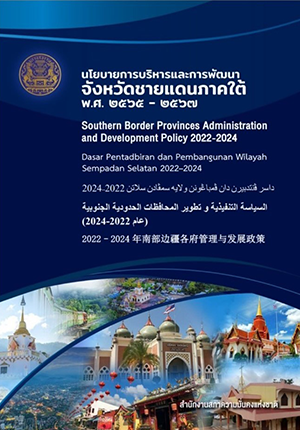
2. Prepare the “Action Plan for Promoting Coexistence in a Multicultural Society in Thailand B.E. 2566 – 2570 (2023 – 2027)” to serve as a mechanism for integrating work from all sectors to promote all culturally diverse groups to live together peacefully in a multicultural society.

3. Prepare policy recommendations for urgently resolving overlapping land use issues, especially residential areas, agricultural areas, cultural areas, and spiritual areas.

4. Prepare an electronic system for reporting performance of the specific security plan of the NSC (Electronic Assessment Report: EAR).

5. Prepare mechanism and approaches for implementing the Action Plan for Promoting Coexistence in a Multicultural Society in Thailand B.E. 2566 – 2570 (2023 – 2027) at the provincial level.
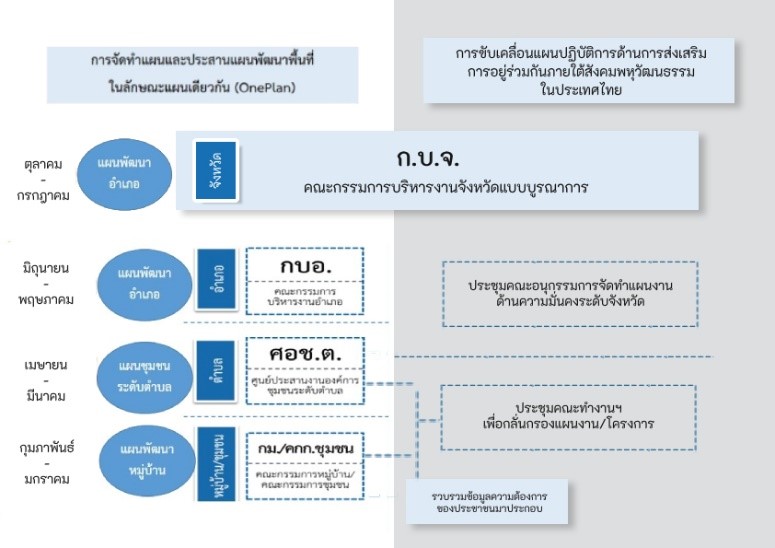
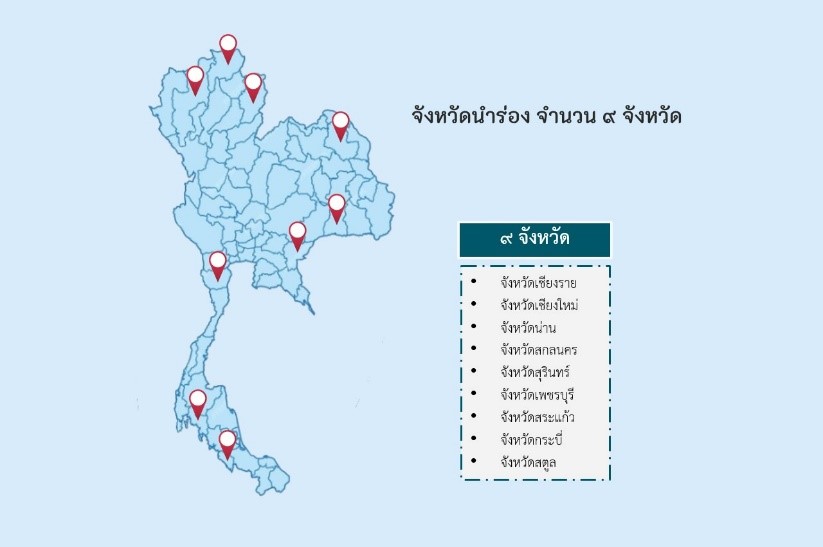
6. Drive educational management work in the southern border provinces.

Division of Maritime Security
Mission:
- Protect national maritime interests in terms of policy, both evaluating and analyzing maritime security situations. Propose, formulate, and drive policies, strategies, plans and measures related to protecting national maritime interests.
- Develop the National Maritime Security Plan B.E. 2566 – 2570 (2023 – 2027) to serve as a framework for various sectors to protect national maritime interests in consistence with strategies, policies and plans at various levels.
Specific Security Plan:
National Maritime Security Plan
Outstanding Performances:
1. Drive implementation of the National Maritime Security Plan 2566 – 2570 (2023 – 2027) by using various mechanisms at both the subcommittee and committee levels to operate under the framework of the National Maritime Interests Protection Act B.E. 2562 (2019).

2. Drive the project “Developing Networks and Cooperation with All Sectors to Enhance Knowledge and National Maritime Interests”, which is an important project under strategies.

3. Promote international cooperation in missions related to national maritime security and interests.

4. Administer implementation of policies and strategies that are strategic operations to support the National Maritime Security Plan by visiting the areas to monitor the maritime security situation, and follow up on implementation of the National Maritime Security Plan

Information and Communication Technology Center*
Mission:
- Develop information systems and data linkage systems within the NSC, including supporting development of security information systems and linkage systems with relevant agencies or government departments.
- Study, develop, manage, maintain, and improve information and communication systems within the NSC.
- Prepare information and communication technology plans, including policies and practices for security maintenance, and develop information and communication technology skills for personnel.
- Collect, analyze, summarize, prepare, drive, monitor, evaluate, and develop policies, strategies, and integrated data plans related to security. Organize security data analysis systems to serve as a framework for policy assessment and decision-making.
- Administer and coordinate security integration cooperation, including proposing appropriate approaches or measures, and coordinating implementation of specific security policies, strategies, and plans in collaboration with relevant agencies.
Outstanding Performances:
1. Prime Minister Award, Thailand Cybersecurity Excellence Award 2024, Category: Agency with advancement in cyber security.

2. Drive the level of preparedness in developing digital government agencies.

3. NSC Cyber Awareness 2024

Secretariat
Mission: Have duties and authority regarding general official duties of the Office and other government agencies that are not separated as duties of any specific division or department. Duties are as follows:
- Document Administration and Public Relations Group is responsible for general administration, and document management of the Office, administration and secretarial work, including public relations work of the Office as well as performing royal ceremonies, state ceremonies, religious ceremonies and various important activities to ensure smooth operations.
- Meeting Administration Group is responsible for organizing various meetings as assigned, providing services and facilitating various matters related to meetings, and supporting public relations work of the Office.
- Fiscal Administration Group is responsible for controlling, supervising, and administering payment and remittance to the treasury; keeping money and financial documents; handling salaries, wages, compensation, pensions, other financial matters; managing budget, preparing income and expenditure control account to control disbursements, and preparing monthly and annual financial reports, and annual production cost accounts.
- Human Resource Management and Development Group is responsible for managing the Office’s human resources in setting up manpower planning system; system for recruitment, appointment and transfer; performance appraisal system; management of compensation, welfare and benefits, including analyzing, suggesting and providing advice to determine the Office’s human resource management policies and strategies.
- Materials, Buildings and Vehicles Management Group is responsible for procurement; controlling and supervising disbursement of office supplies, equipment and vehicle repair costs of the Office as well as taking care of and maintaining the buildings and surrounding areas to ensure they are in a suitable condition and ready for use.
Internal Action Plan Development Group*
Mission:
- Annual Budget Expenditure of the National Security Council
-
1) Prepare annual budget requests of the National Security Council for submission to the Budget Bureau and the Legislative Branch for consideration
2) Manage annual budget allocated in each fiscal year in accordance with action plans and budget-spending plan as well as in line with the goals of the 5-year and annual action plans of the National Security Council.
3) Prepare and publish quarterly reports on performance and budget spending of the National Security Council.
4) Supervise, monitor and evaluate results of the budget spending of the National Security Council, including achievement of action plan and budget spending plan in order to report results to the Budget Bureau. Consider adjusting annual budget spending plan, and prepare budget requests of the National Security Council in compliance with missions, necessity and value in effectively responding to the goals of the national plans and government policies.
- National Security Council Action Plan
-
1) Prepare the National Security Council action plans for 5 years and fiscal year in line with the National Strategy B.E. 2561 – 2580 (2018 – 2037), the Master Plan under the National Strategy on Security Issues B.E. 2566 – 2570 (2023 – 2027) (revised edition), the National Security Policy and Plan B.E. 2566 – 2570 (2023 – 2027), and the government’s key policies.
2) Provide advice, supervise and manage the National Security Council’s operations to ensure they are in line with the goals of the 5-year National Security Council Action Plan in B.E. 2566 – 2570 (2023 – 2027) and fiscal year.
3) Supervise, monitor, and evaluate performance of the National Security Council in line with the goals of the 5-year National Security Council Action Plan in B.E. 2566 – 2570 (2023 – 2027) and fiscal year as well as providing recommendations based on the results of such operations to be used in determining the direction of the National Security Council’s operations in the future.
Outstanding Performances:
1. Prepare and disseminate the 5-year National Security Council Office Action Plan B.E. 2566 – 2570 (2023 – 2027) and the annual action plan.

2. Prepare and disseminate the National Security Council Office’s quarterly reports in performance and budget expenditure.

3. Prepare the action plan management and evaluation system (Plan System) to supervise, monitor, coordinate missions, and evaluate performance according to the action plan and budget expenditure plan of the National Security Council.

* Internal Action Plan Development Group was established under the NSC Order No. 195/2563 dated May 26, 2020.
* Institute of Security Studies was established under the NSC Order No. 275/2563 dated August 7, 2020.
* Information and Communication Technology Center was established under the NSC Order No. 396/2563 dated September 30, 2020.
* Office of Specific Security Experts was established under the NSC Order No. 449/2565 dated October 27, 2022.

